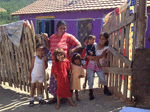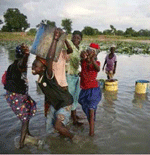|
Serbia: Good targets, out of sight

Family in Blazevo, Novi Pazar, Serbia.
(Photo: UNDP)
|
Serbia’s lack of any long-term vision or commitment as well as any comprehensive development strategies, make it difficult to counter the negative impact of the global economic crisis and establish a solid basis for economic growth, including increased jobs and livelihoods. In this context, with weak democratic institutions and lacking the rule of law, that the MDGs are unlikely to be achieved by 2015. There is thus a strong need to change the current neoliberal economic development paradigm to one that will focus on achieving human development for all.
The latest phase of the Serbian transition to a market economy, started in 2001, was not modelled with a clear vision of achieving economic prosperity and improved livelihoods for all, but focused on the livelihoods of those with economic and political power. Due to the high level of corruption, the lack of effective economic and social policy, and the absence of long-term vision and multisectoral strategies, Serbia cannot counter the consequences of the economic crisis and establish a solid basis for economic growth, one that can increase employment, salaries, livelihoods and quality of life.
Read more
|
Building the Post-2015 Agenda with People living in Extreme Poverty

Photo: ATD Fourth World)
|
The International Movement ATD Fourth World cordially invites you to the panel discussion titled Knowledge from experience: Building the Post-2015 Agenda with People living in Extreme Poverty.
This event is the conclusion to a two-day seminar giving people living in poverty and international development actors in the UN arena the opportunity to exchange ideas on an equal footing. The seminar forms part of ATD Fourth World’s participatory research conducted along-side its grassroots members.
The panel will consist of three sessions chaired by four ambassadors and will include keynote speeches from development stakeholders, academics and people living in poverty. ATD Fourth World will release the results of the participatory research and, participants will then discuss recommendations on the most effective means to deliver a sustainable development framework “that leaves no one behind”.
Read more
Africa's gender agenda 50 years on

Women fetching water. (Photo:
African Agenda)
|
The July 2012 election of Nkosazana Dlamini-Zuma to the position of Chair of the African Union represented not only a milestone in the continental body's history, but it also an affirmation that African women occupying leadership positions had come a long way since the Organization of African Unity was established 50 years ago.
At the time of independence, despite being part and parcel of the different liberation struggles and being members of parliament, in a number of countries, and holding ministerial positions in countries like Ghana and Guinea, there was no similar effort to ensure women's voices were heard at continental level with the establishment of the OAU. And whereas voices such as Dr. Kwame Nkrumah of Ghana were posing questions such as “What part can the women of Africa and the women of African descent play in the struggle for African emancipation?”, the Charter of the OAU had no reference to women or the roles they could play, or how the institution could support their advancement or address focus on gender as well as actively ensuring issues of gender equality.
Read more
Special Focus: UN Women Executive Director
On 15 March 2013, following the 57th Session of the Commission on the Status of Women (CSW), Michelle Bachelet, the first head of UN Women, stepped down as Executive Director (ED) of the United Nations entity mandated to promote gender equality, creating a vacancy for this high level position. Feminists and women’s rights organizations and movements played a crucial role in the creation of UN Women, and have a strong interest in its future, so it is important that women’s rights advocates are informed about the vision and ideas of the different candidates to lead UN Women.
Read more
Corporate Money in Government: What does it mean for Human Rights?
Whether in the realm of environmental oversight, subsidies and tax abatements, consumer labeling and protection, or financial regulation, the human rights impacts of corporate lobbying are extensive. In the United States, much has been made of the impact of campaign financing on elections following the Citizens United ruling by the US Supreme Court in 2010. The ruling ostensibly paved the way for vastly increased financial contributions to political action committees, commonly known as ‘Super-PACs’. But while Citizens Unitedsensitized the public once again to the role of money in elections, this issue has been around for a long time and plays a very big role in the realization of human rights.
Read more
Webinar: Tools for accountability and advocacy
Are you looking for tools to support your advocacy work? The UCLA World Policy Analysis Center (WORLD - has collected data on laws and policies in 193 countries relevant to the priority objectives of Social Watch and member groups, including gender equity, the eradication of poverty, and factors that affect poverty, such as labor conditions and educational policies.
This June, WORLD is offering a unique opportunity for member organizations of Social Watch to learn about this new data source and its potential uses through an interactive webinar and discussion with Dr. Jody Heymann, Dean of the UCLA Fielding School of Public Health and Director of the World Policy Analysis Center, and colleagues at the Center. This webinar will provide an overview of the new data available through WORLD and how these can be accessed, as well as sample findings in the areas of:
- poverty reduction policy (e.g. minimum wage, cash benefits),
- gender equity protections (e.g. constitutional guarantees of equity, disparities in the minimum age of marriage for girls and boys),
- and other key areas such as working conditions and education policy.
Webinars will take place in English, French, and Spanish.
To register for a webinar please complete the form at this link: http://goo.gl/KPjrc.
For a full description of the webinar and more information about the World Policy Analysis Center please click here.
